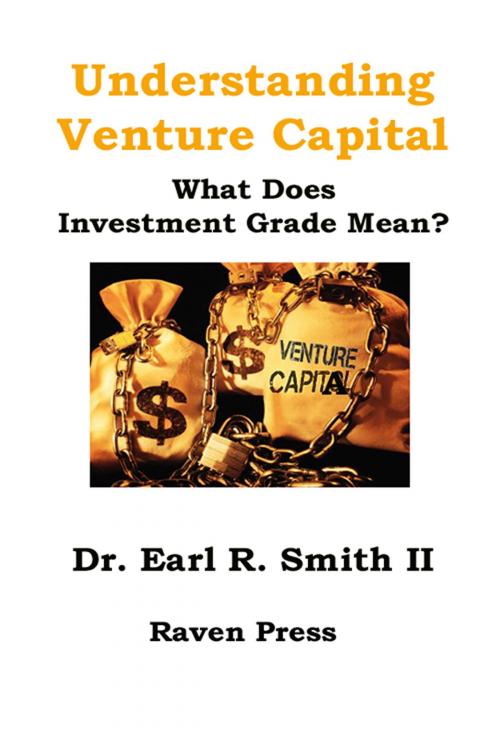| Author: | Earl R Smith II | ISBN: | 9781476398600 |
| Publisher: | Earl R Smith II | Publication: | March 18, 2012 |
| Imprint: | Smashwords Edition | Language: | English |
| Author: | Earl R Smith II |
| ISBN: | 9781476398600 |
| Publisher: | Earl R Smith II |
| Publication: | March 18, 2012 |
| Imprint: | Smashwords Edition |
| Language: | English |
The money chase has been the death of many good companies. There are a range of reasons why this is so. Some companies simply do not deserve funding - they are not an attractive investment opportunity. Others embark on the money chase too early. They haven’t established the business base to justify funding. Still others are run by people who seem to like the money chase better than running the business. All of these reasons and more make embarking on the search for venture funding a perilous business which risks your company and all it may become.
Over the years, I have worked with a large number of companies and management teams that have sailed these choppy seas. I’ve written this book to let you in on some of the knowledge - sometimes hard won - that I have accumulated.
I would be the first to admit that the challenges of getting funded are beyond the scope of this, or any other, book. My intention from the beginning has been to introduce an idea which I have found highly useful - that of "investment grade". My purpose has been to help founders see their company from the perspective of the investor and realize that that view is significantly different from the one they normally have.
Over and over again I encounter founders who have developed significant animosity towards investors. It's easy to find postings on the various social media sites that reflect this animosity. I recently came across one such thread in which the poster spent a great deal of time denigrating investors. Given that this individual was an entrepreneur who was seeking funding, the behavior seemed counterproductive at minimum and self sabotaging. In fact contrary to what this individual was stridently contending, most investors are not stupid, Machiavellian, overbearing, dishonest or any of the other additives that this person was running around. I know a great deal about investors because I do a great deal of work with them. None of them match the description that this individual was putting forth.
The base fact is that the perspective of an investor is fundamentally different than that of a founder. But there is a collateral fact that is important. At critical times in the growth of the company these two different perspectives need each other. The company needs the financial resources in order to unlock the value that the founders have built up. Without those resources, the company will be in a substantial competitive disadvantage and likely will not realize its full potential.
So an accommodation between founders and investors is a gateway through which a company can progress to a greater future. Founders who realize this and are able to reach such an accommodation are the ones who end up running rapidly growing companies. If there is a lesson that I would like to leave you with, it is this:
Learn to understand the attitudes approach and objectives of an investor, except them as legitimate and honest reflections and then approach them in a professional manner, addressing their legitimate concerns and meeting them more than halfway on the journey towards mutual interests.
The money chase has been the death of many good companies. There are a range of reasons why this is so. Some companies simply do not deserve funding - they are not an attractive investment opportunity. Others embark on the money chase too early. They haven’t established the business base to justify funding. Still others are run by people who seem to like the money chase better than running the business. All of these reasons and more make embarking on the search for venture funding a perilous business which risks your company and all it may become.
Over the years, I have worked with a large number of companies and management teams that have sailed these choppy seas. I’ve written this book to let you in on some of the knowledge - sometimes hard won - that I have accumulated.
I would be the first to admit that the challenges of getting funded are beyond the scope of this, or any other, book. My intention from the beginning has been to introduce an idea which I have found highly useful - that of "investment grade". My purpose has been to help founders see their company from the perspective of the investor and realize that that view is significantly different from the one they normally have.
Over and over again I encounter founders who have developed significant animosity towards investors. It's easy to find postings on the various social media sites that reflect this animosity. I recently came across one such thread in which the poster spent a great deal of time denigrating investors. Given that this individual was an entrepreneur who was seeking funding, the behavior seemed counterproductive at minimum and self sabotaging. In fact contrary to what this individual was stridently contending, most investors are not stupid, Machiavellian, overbearing, dishonest or any of the other additives that this person was running around. I know a great deal about investors because I do a great deal of work with them. None of them match the description that this individual was putting forth.
The base fact is that the perspective of an investor is fundamentally different than that of a founder. But there is a collateral fact that is important. At critical times in the growth of the company these two different perspectives need each other. The company needs the financial resources in order to unlock the value that the founders have built up. Without those resources, the company will be in a substantial competitive disadvantage and likely will not realize its full potential.
So an accommodation between founders and investors is a gateway through which a company can progress to a greater future. Founders who realize this and are able to reach such an accommodation are the ones who end up running rapidly growing companies. If there is a lesson that I would like to leave you with, it is this:
Learn to understand the attitudes approach and objectives of an investor, except them as legitimate and honest reflections and then approach them in a professional manner, addressing their legitimate concerns and meeting them more than halfway on the journey towards mutual interests.















